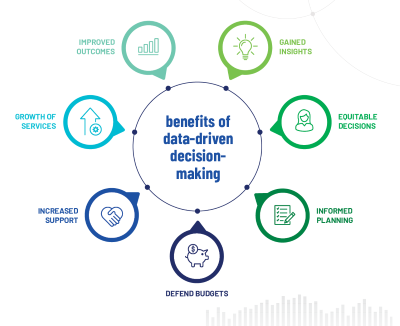
Data-driven decision-making is the process of making organizational decisions based on facts in place of (or to support) opinion or instinct.1 It informs and validates a course of action before committing to it and offers several benefits, as seen in the accompanying diagram.
More and more public service sectors are using data-derived insights to give decision makers accurate information to pinpoint community needs, verify decisions and actions, and quantify the results and impacts of investments and services. Whether prioritizing locations to deliver more equitable experiences, devising community action plans or measuring outcomes of existing strategies, practitioners and planners are using data to make their case. Examples of data-driven decisions include identifying how people are using or want to use public services, deciding where to locate new parks or infrastructure, and supporting the case to maintain or increase the annual budgets for capital improvements, operations and maintenance. For agencies that deliver public services, reliable, sound data can deliver great impact and form the basis of meaningful data stories to share with stakeholders and the public.
When used effectively across a public agency that has adopted a data-driven culture, data can be a great champion for the mission and delivery of that organization’s essential services.
Data-driven decision making includes several steps to ensure the process is sound.:
- Guard against bias and let the data guide the decisions.
- Define objectives the data will be used for.
- Gather the required and reliable data using all available sources.
- Analyze and interpret the data.
- Find unresolved questions in the data.
- Obtain additional data to solve questions.
- Revisit and reevaluate data to confirm translations.
- Present the data to relevant stakeholders.
- Set measurable goals and key performance indicators (KPIs), as well as a path to reach them.
- Continue to evolve and utilize new data to measure/adjust the process.
For sound data-driven decision making in any public agency, adherence to a data culture is imperative. A data culture encompasses the collective behaviors and beliefs of people and teams who value, practice and encourage the use of data to improve decision-making so that doing things with data becomes the solidly integrated norm in the way organizations operate. Achieving a data-driven culture requires a foundational understanding of the insights data provide and how data can improve the way work is completed and decisions are made. Data literacy – this ability to understand, engage, analyze and reason with data – is a key factor for deciphering an organization’s level of data maturity and implementing a data-driven culture. If your team wants to become more data-driven or discover ways to use data to make your case, check out the training, team evaluation and resources linked below.
1. CORE, et.al, ”Compelling Change through Data, A Best Practice Guide. CORE 2023



